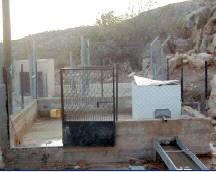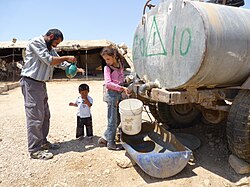পবিত্র রমজান মাসে অধিকৃত পশ্চিম তীরের বিশাল এলাকার গুরুত্বপূর্ণ পানি সরবরাহ বন্ধ করে দিয়েছে ইসরাইলের পানি কর্তৃপক্ষ। এর ফলে পবিত্র রোজার মধ্যে হাজার হাজার ফিলিস্তিনি নিরাপদ পানি থেকে বঞ্চিত হচ্ছে।
ফিলিস্তিনি পানি-বিষয়ক সংস্থা প্যালেস্টাইন হাইড্রোলজি গ্রুপের নির্বাহী পরিচালক আয়মান রাবি আল জাজিরাকে মঙ্গলবার বলেন, কোনো কোনো এলাকায় ৪০ দিন ধরে পানি নেই।
তিনি বলেন, ফিলিস্তিনিরা এখন আশপাশের ঝরনা থেকে সংগ্রহ করা পানি কিনে কোনো রকমে প্রাণ বাঁচাচ্ছে।
জেনিন শহরে ৪০ হাজার লোকের অর্ধেকই এখন পানি থেকে বঞ্চিত।
http://www.bd-desh.net/newsdetail/detail/34/220910
http://http://www.aljazeera.com/news...205022059.html
ফিলিস্তিনি পানি-বিষয়ক সংস্থা প্যালেস্টাইন হাইড্রোলজি গ্রুপের নির্বাহী পরিচালক আয়মান রাবি আল জাজিরাকে মঙ্গলবার বলেন, কোনো কোনো এলাকায় ৪০ দিন ধরে পানি নেই।
তিনি বলেন, ফিলিস্তিনিরা এখন আশপাশের ঝরনা থেকে সংগ্রহ করা পানি কিনে কোনো রকমে প্রাণ বাঁচাচ্ছে।
জেনিন শহরে ৪০ হাজার লোকের অর্ধেকই এখন পানি থেকে বঞ্চিত।
http://www.bd-desh.net/newsdetail/detail/34/220910
http://http://www.aljazeera.com/news...205022059.html





Comment